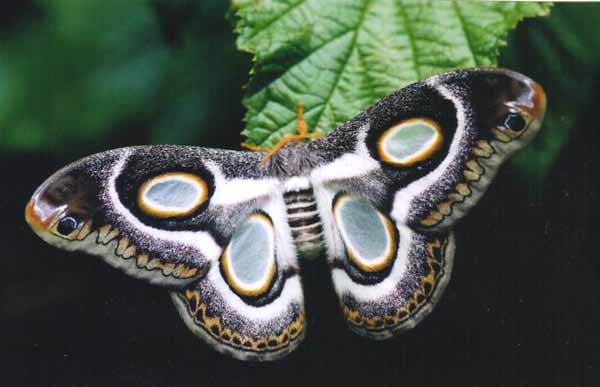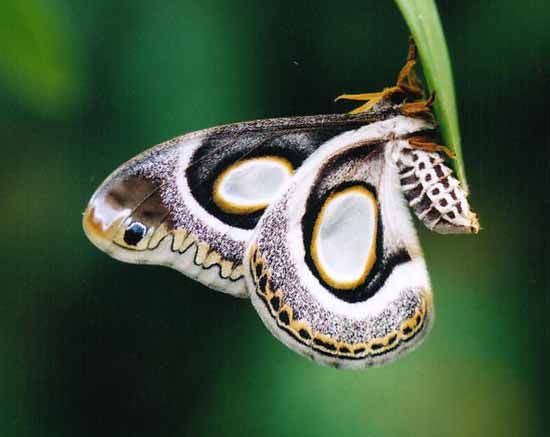Epiphora vicina
|
|
Updated as per Saturnafrica fascicule #12, July 2012, Philip Darge; February 4, 2014
|
Epiphora vicina
Darge, 2012

Epiphora vicina HT male, Amani Forest Reserve, Tanga Region, Tanzania,
November 5, 2005, 210m, on my home computer, digital repair by Bill Oehlke
This site has been created by
Bill Oehlke at oehlkew@islandtelecom.com
Comments, suggestions and/or additional information are welcomed by Bill.
| TAXONOMY:
Superfamily: Bombycoidea, Latreille, 1802
Family: Saturniidae, Boisduval, [1837] 1834
Subfamily: Saturniinae, Boisduval, [1837] 1834
Tribe: Attacini, Blanchard, 1840
Genus: Epiphora, Wallengren, 1860
|
MIDI MUSIC
Wind Beneath My Wings
copyright C. Odenkirk
MIDI CITY
ON.OFF
<bgsound src="wings.mid" LOOP=FOREVER>
|
DISTRIBUTION:
Epiphora vicina (wingspan: males: 91-105mm, possibly
larger; females: ) flies in
Tanzania: Tanga Region: Amani Forest Reserve; Pwani Region:
Fulayosi; Morogoro Region: Mikumi-Kilombero;
Iringa Region: Udzungwa NP; at elevations from 37-406 m..
Male forewings are apically more produced outwardly and in a more narrow fashion compared to the more upwardly produced and broader apex of mythimnia.
In the male, the rectangular white bar extending from the body toward the eyespot falls short of its mark, ending in a relatively straight outer edge with
only a hint of an upturn.
The white forewing pm line is not as boldly prominent (wide) as in mythimnia (especially in its upper half), and its inward curve, as it approaches the body
side of the costa, is not as strong.
The grey suffusions outside the forewing pm line are not as extensive as in most other species with the exception of leae which also has the darker, wider
region in the upper two thirds of the submarginal area.

Epiphora vicina HT male (verso), Amani Forest Reserve, Tanga Region, Tanzania,
November 5, 2005, 210m, on my home computer, digital repair by Bill Oehlke
FLIGHT TIMES AND PREFERRED FOOD PLANTS:
Specimens have been taken in November. There are probably additional additional flight months.
Epiphora vicina larvae probably feed on Citrus, Maesopsis eminii, Paullinia, Zanthoxylum macrophyllum and Fagara macrophylla.
ECLOSION, SCENTING AND MATING:
Epiphora acuta females extend a scent gland from the posterior tip of the abdomen to call in the night-flying males.

Epiphora mythimnia female, courtesy of Stephen Ife.

Epiphora vicina AT female, Fukayosi, Pwani Region, Tanzania,
March 4, 2009, 37m, on my home computer, slight digital repair by Bill Oehlke

Epiphora vicina AT female (verso), Fukayosi, Pwani Region, Tanzania,
March 4, 2009, 37m, on my home computer.

Epiphora mythimnia female, courtesy of
Stephen Ife.
EGGS, LARVAE, COCOONS, AND PUPAE:
The cocoon is double walled and resembles the cocoon of the Hyalphora.
The species name vicina refers to .
Larval Food Plants
It is hoped that this alphabetical listing followed by the common name of the foodplant will prove useful. The list is not exhaustive. Experimenting with
closely related foodplants is worthwhile.
Citrus
Fagara macrophylla.....
Maesopsis eminii
Paullinia
Zanthoxylum macrophyllum.......
| Citrus
East African Satin Wood
Muhumula/Musira
Guarana
Hercules' club
|
Use your browser "Back" button to return to the previous page.





